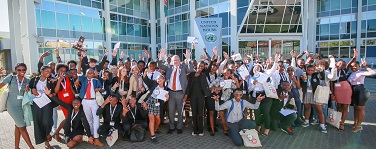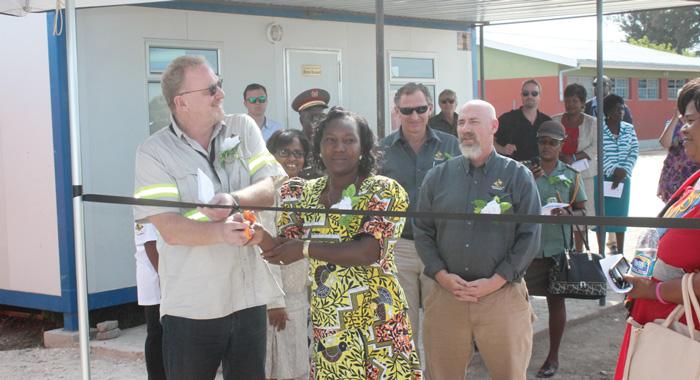
High School learners zoom in on the role of women and girls in climate action

The United Nations Information Centre (UNIC) Windhoek in partnership with the British High Commission in Namibia hosted the Model United Nations Namibia (MUNNAM) High School Conference on 8 and 9 November at the UN House in Klein Windhoek.
This year, delegates from 12 high schools convened to simulate a UN General Assembly session on the topic, “Women and girls must be empowered to make invaluable contributions to, and benefit from, climate action. In so doing we can build sustainable communities.”
The MUNNAM Conference consisted of students from both public and private schools in Namibia, teaming up in pairs to represent their assigned countries as heads of delegations.
The Model UN delegates gain practical skills upon which they can build during their studies and future career paths.
Now in its 10th year of existence, the platform empowered Namibian youth to try their hand at diplomacy, challenging learners to share ideas, build consensus and cultivate skills of persuasion – consequently leading to an intimate understanding of international relations and the role of multilateralism.
“Education is fundamental to the growth and prosperity of a nation. For a developing country like Namibia, it is imperative that we continue to set our sights high to complement traditional learning for our young people,” said Deputy Minister of Education, Arts and Culture Honourable Faustina Caley.
The topic of this year’s conference implored students to consider the relationship between gender and climate action. Consequently, highlights the vulnerability of groups such as women and girls to the effects of climate change and their ability to adapt.
Over the course of two days, children from varying backgrounds showcased great skill and intelligence in grasping and speaking knowledgeably on a complex subject. Students touched on a myriad of related issues during their deliberations including the roles of land, credit, agricultural inputs, decision-making structures, technology, training, and extension services.
“Model UN is a popular activity for those interested in learning more about how the UN operates. The United Nations Model UN Programme aims to build and maintain strong links between the UN and the hundreds of thousands of students, who participate in Model UN across the globe at all educational levels,” said Sen Pang, United Nations Resident Coordinator to Namibia.
MUNNAM lays a foundation for young people to have a vested interest in world politics and is a fun experiential learning activity. It adds great value to the curriculum by covering subject matter in History, Geography, Science, Economics, and English.
“It was truly a pleasure to sponsor #MUNNAM2022. Over the course of just two days, it was a privilege to be able to witness the learners overcome their nerves, become more confident in public speaking, and understand more about global diplomacy. They also made many new friends and contributed fresh ideas to a very relevant international topic. We very much look forward to Model UN 2023”, said Charles Moore, British High Commissioner to Namibia.
British Deputy High Commissioner to the Republic of Namibia, Charlotte Fenton noted that the British High Commission in Windhoek has supported Model UN for the last two years because the two-day conference serves as a unique opportunity for young people in Namibia to experience what it is like to serve in a multilateral institution.
“Climate action is a global responsibility: each and every person has a part to play. Women and girls’ vulnerability to climate change stems from social, economic, and cultural factors. These challenges must be overcome, so that they can be fully empowered and achieve their potential in tackling this global priority to protect our planet, said the British Deputy High Commissioner.
The MUNNAM Conference 2022 takes place against the backdrop of global crises including the threat to multilateralism because of current geopolitical circumstances; spiraling food and energy prices as well as growing public finance and public debt crisis in many countries that were already struggling to contend with the devastating impacts of the COVID-19 pandemic.
These cumulative crises have pushed back the progress made in achieving the SDGs such as SDG 13: Climate Action, prior to the COVID-19 pandemic.
“It is my personal wish that this conference ignited a desire among the students to act in their own capacity to accomplish the SDGs. Whether its small projects at your school or within your community – I hope you leave this conference with the knowledge that change starts with action and you all have the power to act”, added Pang.
At the conclusion of the 2022 MUNNAM conference the high school delegates successfully passed a resolution that included a clause “to increase access to green and good quality jobs for women and for cities to actively take actions to mitigate greenhouse gas emissions through prioritizing women in low-carbon and equitable mobility and urban planning solutions…”
Standout performances during the conference were acknowledged during the prize-giving ceremony. The winners were: Immanuel Uirab from Hochland High – Best Delegate; Nee Thanks Uupindi from Hage Geingob High School & Andrealda Canuela from Hochland – Best Delegation; Ishaan Agrawal from Windhoek International School – Best Speaker; Best School – Deutsche Höhere Privatschule Windhoek (DHPS).













































